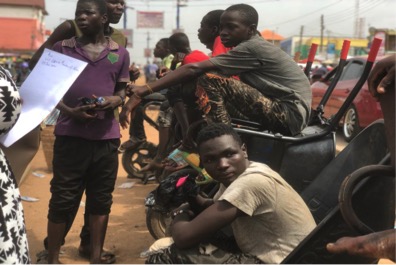CRIME CHECK FOUNDATION ENGAGES MEDIA ON CHALLENGES OF ‘VAGRANTS’
Crime Check Foundation (CCF) has engaged the media on challenges vagrants and other poor persons face in Ghana.
Vagrants, (the homeless, street hawkers, head porters, truck pushers, and market women, etc.) who are voiceless are often arrested, fined and even imprisoned under various laws for ‘no serious crimes’.
The media event forms part of the implementation of the OSIWA-funded “Decriminalizing Vagrancy Laws and Advocacy” project by CCF in Ghana.
Challenges of Vagrants
In a statement to journalists at the Accra International Press Centre on Wednesday, 15th December 2021, the Executive Director of CCF, Ibrahim Oppong Kwarteng, said findings made under the “Decriminalizing Vagrancy Laws and Advocacy” project reveal that vagrants break the laws because they lack social amenities, their rights are abused because they are voiceless, they are targeted for revenue, and they lack legal support when they face prosecution due to their vulnerability.
“Most of the homeless, track pushers, commercial drivers, market women, among others, do not have access to basic social amenities such as toilet facilities, market spaces, and packing terminals. As a result, they are ‘pushed’ to engage in open defecation, sleep under bridges at night, or sell and pack at unauthorized places,” he noted.
“The rights of vagrants are abused on daily basis in most MMDAs. This is evident in physical, and emotional abuses petty traders, as well as poor and homeless truck pushers, suffer when they are beaten by Assembly Task Force or have their goods seized for ‘doing business at unauthorized areas’. While some of these citizens are simply recalcitrant, most of them are ignorant of the laws and are compelled by poverty,” he added.
“It is a sight to behold in some of the Assemblies which through their ‘guards’ busily engage in the seizure of goods, and motorbikes, from poor market women and boys on a typical ‘business day’. The poor victims are fined various sums or have their goods confiscated when they default, thereby depriving them of their capital and livelihood,”
Creating Enabling Environment for Vagrants
Outlining some of the achievements under the project, Mr. Kwarteng noted that the organization has undertaken media sensitizations on vagrancy laws in 12 project districts within Greater Accra, Ashanti, and Central Regions for ‘vagrants’ to know, claim and exercise their rights and responsibilities to end ‘criminalization of poverty in Ghana.
In order to create an enabling environment for vagrants, he said the Foundation has engaged Justice Sector Institutions (JSIs) on vagrancy laws and the need to pass the Non-Custodial Sentencing Bill into Law. It has also built capacity for a core group of journalists and community monitors who are supporting media campaigns, monitoring, and reporting of infractions perpetrated under vagrancy laws.
He emphasized that sensitization on vagrancy laws by CCF would address the low citizens’ knowledge of the laws, which leads to arrests, fines, and imprisonments of vagrants because they are unable to differentiate between their rights and responsibilities.
Making some recommendations, Mr. Kwarteng called for the prioritization and provision of the needs of vagrants by national and local governments.
He also entreated the media and other Civil Society Organizations (CSOs) to join forces with CCF to push for the passage of the Non-Custodial Sentencing Bill, to allow for alternative sentencing regimes such as community service.
Representatives from the Commission on Human Rights and Administrative Justice (CHRAJ) and the Judicial Service of Ghana were present at the programme.
About OSIWA:
The Open Society Initiative for West Africa (OSIWA), established in 2000, is a grant-making and advocacy organization focused on equality, justice, democratic governance, human rights, and knowledge generation. It is part of the global network of Open Society Foundations spread across 37 countries around the world. He said the Assemblies outrageously fine these vagrants for committing petty offences.
By Cosmos Akorli and Rudolph Nandi




